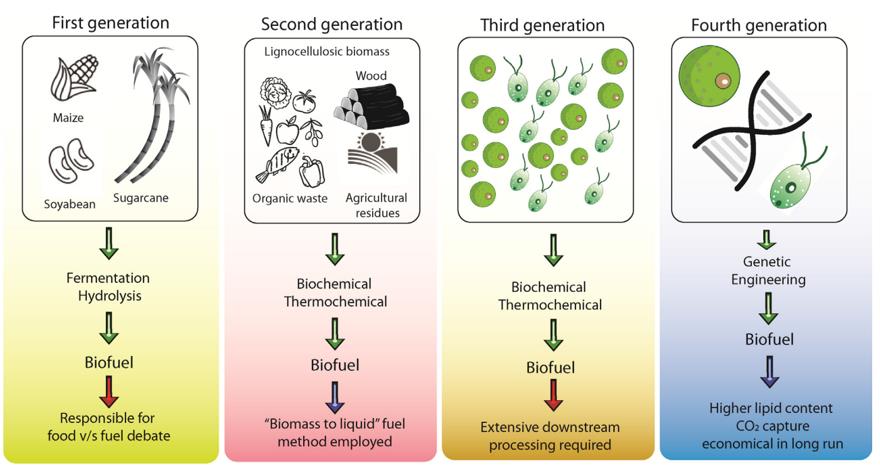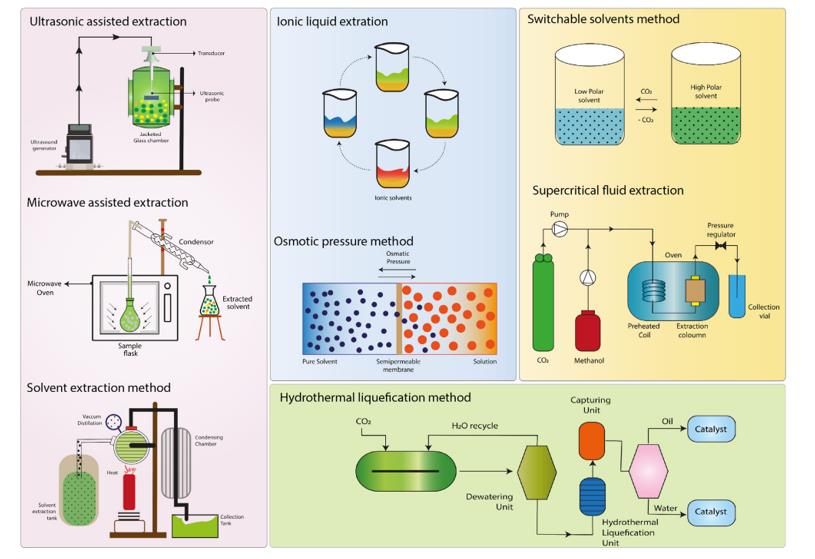Monitoring Services for Algae Biofuel Production
As a biofuel, algae biofuel is biodegradable, non-toxic, environmentally friendly, and sustainable, and has received attention from scientists worldwide.
As a global leader in algae research, Lifeasible provides professional monitoring services for algae biofuel production to facilitate the commercialization of algae biofuels for our clients.
Introduction to Biofuel
A major portion of global fuel consumption is met by fossil fuels such as coal, petroleum products, and natural gas, which are non-renewable resources. As a result, alternative energy sources are gaining more popularity to meet the global market demand. Among the renewable energy sources, biofuels are gaining more attention as an alternative to fossil fuels and a lot of research work is going on to produce sustainable bioenergy in the long term.
 Fig.1 Generations of biofuels. (Anto, S., et al., 2020, Chemosphere)
Fig.1 Generations of biofuels. (Anto, S., et al., 2020, Chemosphere)
First-Generation Biofuels - Produced from foodstuffs such as sugar, starch, corn, rapeseed, sugar beet, sunflower, wheat, and barley.
Second-Generation Biofuels - Produced from non-edible lignocellulosic feedstock such as tree biomass, bagasse, jatropha, agricultural residues, demolition wood, straw, and grass.
Third-Generation Biofuels - Produced from faster-growing and higher oil-content photosynthetic microorganisms such as microalgae, cyanobacteria, and seaweeds.
Fourth-Generation Biofuels - Produced from genetically engineered photosynthetic microorganisms to further increase biofuel production.
Advantages of Biofuel Production from Algae
Most microalgal species have the potential for biofuel production. Firstly, because of their high lipid content of 50-70% and even up to 80% oil content in the biomass of microalgae B. braunii, which facilitates the production of biodiesel. Secondly, microalgae possess a high content of different carbohydrates such as glycogen, starch, agar, and cellulose, which can be easily converted into fermentable sugars for bioethanol production.
Algae Pretreatment for Algae Biofuel Production
Algae can be divided into microalgae and macroalgae. Of these two, microalgae are well suited for biofuel production, especially because of their high carbohydrate and lipid content. However, before using these biomasses for carbohydrate and lipid extraction, a pretreatment step is essential, which varies depending on the feedstock used for biofuel production.
 Fig.2 Different lipid extraction techniques for algae. (Anto, S., et al., 2020, Chemosphere)
Fig.2 Different lipid extraction techniques for algae. (Anto, S., et al., 2020, Chemosphere)
Our Services
Microalgae are considered as potential biofuel producers because of their rapid growth and high oil content. With many years of experience in algae research, testing, and analysis, Lifeasible has accumulated a wealth of knowledge and specialized equipment to support our professional monitoring services for algae biofuel production.
Growth Rate Measurement Service for Algae
As the most critical step in the production of biofuels from algae, the large-scale and rapid growth of algae using culture media or waste from factories has received a lot of attention. Lifeasible offers growth rate measurement services for algae based on methods such as weighing biomass, cell counting methods, and by optical density.
Quality Control Service for Algae Biofuel
Biofuels produced from algae require a series of analyses and tests, including light-to-biomass conversion efficiency and the properties of the biofuel itself before they can be put into commercial use. Lifeasible has specialized equipment and instruments to analyze and test algae biofuel products.
Why Choose Us
As a pioneer in the field of algae research and commercial development, Lifeasible is capable to provide monitoring services for algae biofuel production by professional teams and advanced devices to support algae-related projects for our clients. Please contact us for more information.

Reference
- Anto, S., Mukherjee, S. S., Muthappa, R., Mathimani, T., Deviram, G., Kumar, S. S., ... & Pugazhendhi, A. (2020). Algae as green energy reserve: Technological outlook on biofuel production. Chemosphere, 242, 125079.
Our services are for research use only and not for any clinical use.